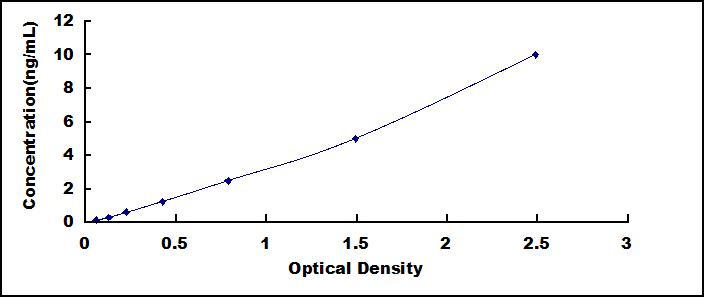Packages (Simulation)

Reagent Preparation

Image (I)
Image (II)
Certificate


High Sensitive ELISA Kit for Ubiquitin Carboxyl Terminal Hydrolase L1 (UCHL1)
PARK5; PGP9.5; Uch-L1; Neuron cytoplasmic protein 9.5; Ubiquitin thioesterase L1; Ubiquitin carboxyl-terminal hydrolase isozyme L1
- Product No.HEG945Hu
- Organism SpeciesHomo sapiens (Human) Same name, Different species.
- Sample Typetissue homogenates, cell lysates, cell culture supernates and other biological fluids
- Test MethodDouble-antibody Sandwich
- Assay Length3h
- Detection Range0.156-10ng/mL
- SensitivityThe minimum detectable dose of this kit is typically less than 0.057ng/mL.
- DownloadInstruction Manual
- UOM 48T96T 96T*5 96T*10 96T*100
- FOB
US$ 539
US$ 770
US$ 3465
US$ 6545
US$ 53900
For more details, please contact local distributors!
Specificity
This assay has high sensitivity and excellent specificity for detection of High Sensitive Ubiquitin Carboxyl Terminal Hydrolase L1 (UCHL1).
No significant cross-reactivity or interference between High Sensitive Ubiquitin Carboxyl Terminal Hydrolase L1 (UCHL1) and analogues was observed.
Precision
Intra-assay Precision (Precision within an assay): 3 samples with low, middle and high level High Sensitive Ubiquitin Carboxyl Terminal Hydrolase L1 (UCHL1) were tested 20 times on one plate, respectively.
Inter-assay Precision (Precision between assays): 3 samples with low, middle and high level High Sensitive Ubiquitin Carboxyl Terminal Hydrolase L1 (UCHL1) were tested on 3 different plates, 8 replicates in each plate.
CV(%) = SD/meanX100
Intra-Assay: CV<10%
Inter-Assay: CV<12%
Stability
The stability of kit is determined by the loss rate of activity. The loss rate of this kit is less than 5% within the expiration date under appropriate storage condition.
To minimize extra influence on the performance, operation procedures and lab conditions, especially room temperature, air humidity, incubator temperature should be strictly controlled. It is also strongly suggested that the whole assay is performed by the same operator from the beginning to the end.
Reagents and materials provided
| Reagents | Quantity | Reagents | Quantity |
| Pre-coated, ready to use 96-well strip plate | 1 | Plate sealer for 96 wells | 4 |
| Standard | 2 | Standard Diluent | 1×20mL |
| Detection Reagent A | 1×120µL | Assay Diluent A | 1×12mL |
| Detection Reagent B | 1×120µL | Assay Diluent B | 1×12mL |
| TMB Substrate | 1×9mL | Stop Solution | 1×6mL |
| Wash Buffer (30 × concentrate) | 1×20mL | Instruction manual | 1 |
Assay procedure summary
1. Prepare all reagents, samples and standards;
2. Add 100µL standard or sample to each well. Incubate 1 hours at 37°C;
3. Aspirate and add 100µL prepared Detection Reagent A. Incubate 1 hour at 37°C;
4. Aspirate and wash 3 times;
5. Add 100µL prepared Detection Reagent B. Incubate 30 minutes at 37°C;
6. Aspirate and wash 5 times;
7. Add 90µL Substrate Solution. Incubate 10-20 minutes at 37°C;
8. Add 50µL Stop Solution. Read at 450nm immediately.
GIVEAWAYS
INCREMENT SERVICES
| Magazine | Citations |
| J Neurol Sci | Changes of ubiquitin C-terminal hydrolase-L1 levels in serum and urine of patients with white matter lesions PubMed: 26232084 |
| Journal of the Neurological Sciences | Increased plasma UCH-L1 after aneurysmal subarachnoid hemorrhage is associated with unfavorable neurological outcome Pubmed:26810533 |
| Ulutas Medical Journal | Serum Carnosine Dipeptidase 1 and Ubiquitin C - Terminal Hydrolase L1 as Markers of Brain Damage in Patients after Carotid Endarterectomy mnstemps:135 |
| Scientific Reports | Activation of hepatic stellate cells by the ubiquitin C-terminal hydrolase 1 protein secreted from hepatitis C virus-infected hepatocytes pubmed:28667290 |
| Intensive Care Medicine | Relationships between markers of neurologic and endothelial injury during critical illness and long-term cognitive impairment and disability Pubmed:29523900 |
| Earth and Environmental Science | Serum concentration of ubiquitin c-terminal hydrolase-L1 in detecting severity of traumatic brain injury article:10.1088 |
| Peripheral blood biomarkers in aneurysmal subarachnoid hemorrhage ISBN:978-952-03-0750-9 | |
| Journal of Critical Care | Association of neuronal repair biomarkers with delirium among survivors of critical illness Pubmed: 31896448 |
| Brain Sciences | BDNF and IL-8, But Not UCHL-1 and IL-11, Are Markers of Brain Injury in Children Caused by Mild Head Trauma Pubmed: 32987792 |













